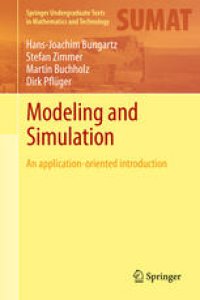
Ebook: Modeling and Simulation: An Application-Oriented Introduction
- Genre: Education
- Tags: Computational Science and Engineering, Computational Mathematics and Numerical Analysis, Mathematical Modeling and Industrial Mathematics, Simulation and Modeling
- Series: Springer Undergraduate Texts in Mathematics and Technology
- Year: 2014
- Publisher: Springer-Verlag Berlin Heidelberg
- Edition: 1
- Language: English
- pdf
This book provides an introduction to mathematical and computer-oriented modeling and to simulation as a universal methodology. It therefore addresses various model classes and their derivations. And it demonstrates the diversity of approaches that can be taken: be it discrete or continuous, deterministic or stochastic. A common underlying theme throughout the book are the means in which one obtains practical simulation results from these different abstract models.
Subsequent to a brief review of the mathematical tools that are required, the concept of the simulation pipeline, "from model derivation to the simulation", is applied to 14 example scenarios from diverse fields such as "Game theory - deciding - planning", "Traffic on highways and data highways", "Dynamical systems" and "Physics in the computer".
Whether it is game theory or mathematical finance, traffic or control theory, population dynamics or chaos, or molecular dynamics, continuum mechanics or computer graphics - the reader gains insight into the world of simulation in a descriptive yet systematic way.
This book provides an introduction to mathematical and computer-oriented modeling and to simulation as a universal methodology. It therefore addresses various model classes and their derivations. And it demonstrates the diversity of approaches that can be taken: be it discrete or continuous, deterministic or stochastic. A common underlying theme throughout the book are the means in which one obtains practical simulation results from these different abstract models.
Subsequent to a brief review of the mathematical tools that are required, the concept of the simulation pipeline, "from model derivation to the simulation", is applied to 14 example scenarios from diverse fields such as "Game theory - deciding - planning", "Traffic on highways and data highways", "Dynamical systems" and "Physics in the computer".
Whether it is game theory or mathematical finance, traffic or control theory, population dynamics or chaos, or molecular dynamics, continuum mechanics or computer graphics - the reader gains insight into the world of simulation in a descriptive yet systematic way.


















